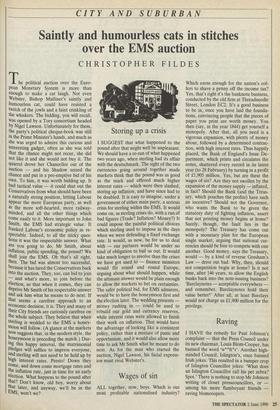Storing up a crisis
I SUGGEST that what happened to the pound after that might well be unpleasant. We should have a re-run of what happened two years ago, when sterling had its affair with the deutschmark. The sight of the two currencies going around together made markets think that the pound was as good as the mark and offered much higher interest rates — which were then slashed, storing up inflation, and have since had to be doubled. It is easy to imagine, under a government of either main party, a serious crisis for sterling within the EMS. It would come on, as sterling crises do, with a run of bad figures (Trade? Inflation? Money?) It could impose the painful political choices which sterling used to impose in the days when we were defending a fixed exchange rate. It would, as now, be for us to deal with — our partners would be under no kind of obligation to bail us out. It would take much longer to resolve than the crises we have got used to — finance ministers would flit round and round Europe, arguing about what should happen, while the ultimate answer would be plain enough to allow the markets to bet on certainties. The safer political bid, for EMS admirers, would be to have the honeymoon first and the election later. The wedding presents— money rushing in — could be used to rebuild our gold and currency reserves, while interest rates were allowed to finish their work on inflation. That would have the advantage of looking like a consistent policy, rather than a mixture of panic and opportunism, and it would also allow more time to ask Mr Smith what he meant to do next. As for the man who started the auction, Nigel Lawson, his facial express- ion must rival Webster's.


















































 Previous page
Previous page